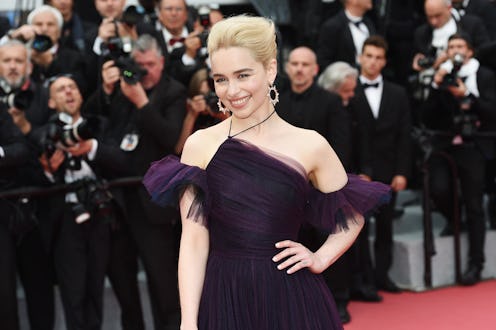Entertainment
Emilia Clarke's 'GoT' Salary History Is Almost Unheard Of & Now She's Doing Something About It

Amid all of the stories about the gender wage gap in Hollywood, there's one account that will make you cheer. As it turns out, Emilia Clarke has always received equal pay for Game of Thrones — and the actor didn't even realize other shows weren't being run the same way. According to Variety, Clarke discussed the topic on Tuesday at the Cannes Film Festival and said,
"On 'Game of Thrones,' I have always been paid the same amount as my male co-stars... It was my first job and I was not discriminated against because I was a woman, in my paycheck."
While it's difficult to imagine many people who don't recognize her name these days, a quick look at Clarke's IMDb page confirms that Game of Thrones was her big break. It's great to hear that she never experienced wage discrimination in Hollywood firsthand, though she's now learning about other women's less positive experiences on other shows.
The Game of Thrones actor also shared that she was surprised to hear about the recent wage gap controversy involving Netflix's The Crown. After news broke that Claire Foy earned less than Matt Smith for her work on The Crown, it was announced that Foy would reportedly receive $275,000 in back pay. According to Variety, Clarke said the news about The Crown was "shocking, actually shocking."
Clarke also said now that she knows more about discrepancies like this one, she's learning to "fight harder" for equal pay. "You start to dig deep and see where it is, rife in the industry. So I think it's mainly in the beginning, just be aware of that and going, 'Can you just check?,'" she said. "You just start to fight harder for that stuff."
For her part, Foy said during a panel discussion about The Crown that the situation started a conversation about gender inequality in Hollywood. According to Variety, Foy said in April,
"I have had the most extraordinary revelation about myself and womankind. It's sort of amazing that the conversations people are having now, people think we've always been able to have, but we haven't. You asking me that question is probably the first time in my career that anybody has ever asked me about being a woman in this industry, or just being a woman in general, and to me I find that amazing."
Unfortunately, The Crown is one of a number of Hollywood projects that have been called out recently for a wage gap. Variety recently reported that Bryce Dallas Howard was paid less than Chris Pratt for Jurassic World: Fallen Kingdom. The difference is reportedly a lot less, too — according to the magazine, Pratt made $10 million for Jurassic World: Fallen Kingdom, while Howard reportedly made $8 million. Considering the fact that some have criticized the movie for its seemingly sexist treatment of Howard's character, the wage gap news wasn't a great look. (When news broke about the Jurassic World pay gap, Bustle reached out to Universal Pictures, as well as Howard’s rep, for comment, but did not receive an immediate response.)
It's nothing new for big-name actors to receive large Hollywood paychecks. As Variety noted, Robert Downey Jr. reportedly earned $10 million for his appearance in Spider-Man: Homecoming — the same salary Pratt earned for Jurassic World — even though he wasn't a huge player in the movie. But when it comes to actors who share leading roles in a project, like Foy and Smith on The Crown, and Howard and Pratt in Jurassic World, things get trickier.
Still, it's great to see that Clarke never experienced the gender wage gap during her time on Game of Thrones. Hopefully, other producers will take a hint from GoT and offer leading stars the same salaries for future movies and TV shows, regardless of gender. In the meantime, it's important to hear stories like Clarke's and Foy's, and to keep speaking out about gender inequality. Fortunately, things like the Time's Up movement are calling attention to gender inequality in all of its manifestations. And it's time for Hollywood to listen.